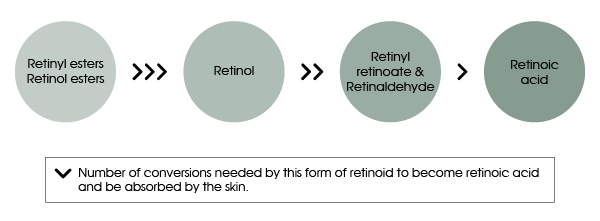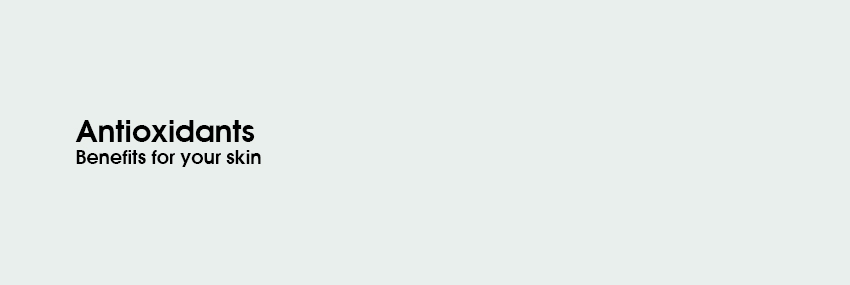Does your skin feel dull? Do you want to avoid premature aging? Antioxidants are skincare ingredients that will help you get a younger, brighter skin. If you want to learn how they do it, what are my favorite products and where you can get them, you’ll find all that (and more) in this guide!
Today I am finally going to talk about a very interesting type of actives that we often do not know in depth: antioxidants. This category, which is quite broad, includes ingredients that I have already told you about on previous occasions, such as vitamin C. Do you want to know what antioxidants are and what they can contribute to your routines? Keep reading!
The topics that you will find in this article are the following:
- What are antioxidants?
- What are the most effective antioxidants?
- How to incorporate antioxidants into your skincare routines.
1. WHAT ARE ANTIOXIDANTS?
Our skin is subjected to constant stress due, mainly, to external factors (such as ultraviolet radiation, pollution or our lifestyle). Faced with this imbalance, various tissues form what we know as free radicals, a type of molecules with an unpaired electron and which are also usually called ROS (Reactive Oxygen Species). When free radicals are produced excessively, they damage the tissues around them through oxidative stress, which our body tries to stabilize through its antioxidant system. Proteins (such as collagen and elastin), lipids and our DNA are the most exposed to this oxidative stress.
Why is it important for you to know this? Because free radicals damage our skin by attacking collagen and elastin fibers and promoting dehydration, which leads to various problems such as the appearance of wrinkles, spots or acne. By this I do not mean that free radicals are harmful by themselves, in fact they have an important role as a defense mechanism of our body, but it is important to keep a balance between them and our antioxidant system.
We can adopt different strategies when it comes to dealing with free radicals, the most important of which is to use sunscreen daily in addition to leading a healthy lifestyle. However, sometimes we may need to give our skin a little extra care and that is where antioxidants come into play.
Antioxidants are a very wide set of molecules that are found naturally in our skin and that neutralize free radicals by providing them with that missing electron. It is usually differentiated between endogenous antioxidants (those that occur naturally in our skin) and exogenous antioxidants (those that we can provide through cosmetics or food). The antioxidant system of our skin includes some that you will surely know, such as ascorbic acid or vitamin C, tocopherol or vitamin E, vitamin A or coenzyme Q10.
The epidermis is the layer of the skin with the highest proportion of antioxidants and they are distributed progressively, with a higher concentration in the deeper layers of the stratum corneum (you can learn more about the layers of the skin in this other article).
Now you are probably wondering how antioxidants prevent free radicals from damaging your skin. You already know that they provide the electron that free radicals lack, but when it comes to interrupting the oxidative stress reaction, antioxidants act in different ways: preventing the formation of free radicals, destroying the free radicals themselves, or boosting the performance of our antioxidant system.
If we want to actively prevent free radicals from damaging our skin, we can do it in different ways (apart from improving our lifestyle), the most important being the use of sunscreen on a daily basis. In addition to this, using topical antioxidants (such as those found in some cosmetics) also achieve very positive results.
2. WHAT ARE THE MOST EFFECTIVE ANTIOXIDANTS?
Now that you know what we mean when we talk about antioxidants and how they can help you take better care of your skin, you may be wondering which ones are the most effective in keeping free radicals at bay. We must start from the basis that there is still a lot of pending research on this topic, but luckily science does not stop progressing and advances are constantly being made.
Next, I’m going to tell you a little about some of the most effective antioxidants that you can find in your cosmetics so that, from now on, you know which ones to look for. Although I have selected some very interesting ones here, keep in mind that the variety is much wider.
Retinoids (vitamin A)
If you want to know them a little better, here you can read my complete guide on retinoids. These ingredients have many uses in cosmetics, and in addition to acting as antioxidants, they accelerate the cell turnover process and help prevent skin aging, reducing wrinkles and fine lines. In addition, certain forms of retinoids are an effective acne treatment.
These types of ingredients, despite being very interesting, must be used with caution, always incorporating them into our PM routines and being very constant with the use of sunscreen (which you already know should be an essential part of your basic skincare routine). If you are interested in starting to use retinoids, I advise you to take a look at my guide on the subject.
There is a wide variety of formulas with retinoids, but I advise you to start with a mild product, such as The Ordinary Granactive Retinoid 2% Emulsion, available at DECIEM (recommended) and the Paula’s Choice Clinical 1% Retinol Treatment, which you can find on Paula’s Choice and on Niche Beauty.

Niacinamide (vitamin B3)
Niacinamide is a very common antioxidant in our cosmetics and it can bring you very interesting benefits. If there are two aspects that differentiate niacinamide from other antioxidants and that I would like to highlight, they are, on the one hand, its ability to help reduce oil levels in the skin and, on the other, its effectiveness in minimizing redness (which may interest you if you usually have sensitive skin). In addition to this, niacinamide also inhibits the process by which melanin is produced, responsible for the appearance of spots, so it can be an interesting ally to reduce them.
If you want to start incorporating niacinamide into your skincare routines, a very inexpensive and effective option is The Ordinary Niacinamide 10% + Zinc 1%, available on The Ordinary. In any case, my favorite niacinamide serum to date is the Paula’s Choice 10% Niacinamide Booster, available on Paula’s Choice and on Niche Beauty, it has everything you could look for in a product of this type.
Ascorbic acid (vitamin C)
In my guide on vitamin C you can read in more detail about this ingredient. Ascorbic acid is one of my favorite ingredients in cosmetics for its many applications, since in addition to minimizing the damage that free radicals cause to our skin, it also inhibits the production of melanin, responsible for the appearance of spots and helps to improve the luminosity of the skin. In addition, it indirectly helps prevent aging, influencing the production of collagen and elastin. If you are concerned about any of these issues, vitamin C will be a great ingredient to incorporate into your beauty routines.
If you want to start introducing vitamin C, I recommend doing it with one of the many derivatives of ascorbic acid, thus allowing your skin to acquire tolerance while avoiding the potential irritation that certain formulas of ascorbic acid itself can cause. In my guide on vitamin C you can find a summary in which I explain step by step how to start using it to get the most out of it.
A good product to start using vitamin C can be Paula’s Choice C15 Super Booster, available on Paula’s Choice and on Niche Beauty. If your skin has already acquired a certain tolerance to vitamin C, you could incorporate The Ordinary Vitamin C Suspension 23% + HA Spheres 2%, which you can find on DECIEM (recommended) into your skincare routines.
Here you can see a comparison of vitamin C serums in case you want to see more alternatives.
Tocopherol (vitamin E)
This is one of the antioxidants with more studies supporting its effectiveness, and as with vitamin C, we can find it in different forms. In addition to its antioxidant capacity, it is interesting to note that it can also prevent damage caused by ultraviolet radiation and even provide anti-inflammatory effects.
The passage of time and exposure to pollution and unprotected ultraviolet radiation cause our natural levels of vitamin E to decrease, so incorporating a good product that contains it into your beauty routines can be especially useful.
Vitamin E is present in many cosmetics, so it is easy to find a formula that interests you when you start using it. One product that I especially like (and that you can use to finish your night routines) is the Klairs Freshly Juiced Vitamin E Mask, available on Wishtrend and on Yesstyle.
Resveratrol
Resveratrol is an antioxidant that is obtained mainly from the skin of grapes, and in addition to preventing the damage caused by free radicals it also has anti-inflammatory properties, especially against the damage caused by UVB radiation, about which you can read more in this other article. In addition, it is effective in reducing hyperpigmentation without the potential irritation caused by other ingredients that also help improve spots. If you usually have sensitive skin and experience irritation, resveratrol can be an interesting ally to include in your beauty routines.
When it comes to incorporating resveratrol into your beauty routines, you can do it with options for all budgets, such as The Ordinary Resveratrol 3% + Ferulic Acid 3%, available on DECIEM (recommended).
Ferulic acid
Ferulic acid can come in handy if you already use a vitamin C serum in your skincare routines, as it helps stabilize it for better results. In addition to this, it has a double antioxidant action, since it prevents the appearance of free radicals and reduces their activity. Remember I said earlier that resveratrol helps prevent damage caused by UVB radiation? In the case of ferulic acid, it prevents inflammation caused by UVA radiation (the main cause of skin aging).
This double protection against UVA and UVB radiation is what makes you especially interested in incorporating a serum like The Ordinary Resveratrol 3% + Ferulic Acid 3%, available on DECIEM (recommended) into your morning routines.
Ubiquinone (Coenzyme Q10)
Coenzyme Q10 is an antioxidant that our own body produces naturally, but its levels decrease over the years. In addition to acting topically, ubiquinone has many other uses (it is used as a treatment for certain heart or neurological problems), but we are going to focus on its usefulness when it comes to taking care of our skin.
By incorporating coenzyme Q10 into our beauty routines, we are able to increase the levels of this antioxidant in our body, superficially and deeply. Precisely, by increasing its surface levels, we are able to improve the health of our skin barrier and prevent the damage caused by ultraviolet radiation.
Superoxide dismutase
When we speak of superoxide dismutase (SOD), we refer to a series of enzymes whose main function is to defend different types of cells in our body against free radicals. By incorporating this ingredient into our skincare routines through our cosmetics, we can also benefit from its anti-inflammatory properties (something that should be taken into account if your skin tends to become sensitized or to irritation) and its ability to prevent various signs of aging (such as wrinkles, fine lines and spots). Although more research still needs to be done on the various ways these types of ingredients can help us maintain healthy skin, it is true that the outlook is very optimistic.
If you want a recommendation to incorporate superoxide dismutase into your beauty routines, NIOD has a fantastic mist that also incorporates different anti-inflammatory ingredients, the NIOD Superoxide Dismutase Saccharide Mist (SDSM2), available on DECIEM (recommended).
EUK-134
In the previous section, I talked about what superoxide dismutase (SOD) is and how it plays a central role in the antioxidant system of our body. In the case of EUK-134, we are going to take a step further, and that is that this antioxidant replicates or imitates the activity of SOD, preventing the damage caused by free radicals (and their accumulation) and, indirectly, aging of the skin. In addition, it helps keep the skin barrier protected and has been shown to prevent inflammation caused by UVA radiation (the main cause of photoaging).
You probably already know the product (you may have come to this article through my review), but to start incorporating this antioxidant into your skincare routines, I advise you to do it with a serum like The Ordinary EUK-134 0.1%, available on DECIEM (recommended).
3. HOW TO INCORPORATE ANTIOXIDANTS INTO YOUR SKINCARE ROUTINES.
Generally speaking, antioxidants are simple ingredients to incorporate into our skincare routines, but there are certain aspects that should be taken into account to get the maximum possible benefit from their use.
Do a patch test before adding the new product to your beauty routine. This tolerance test is essential when it comes to finding out if our skin can react negatively to the new cosmetics that we start to use, so your skin can be quite thankful for this simple gesture.
The best time to use antioxidants is in your morning routine. This is how you prepare your skin to deal with the whole day, and that includes all the UV radiation exposure you can go through. You already know that sunscreen is an essential part of your basic skincare routine, you have to use it daily. By applying antioxidants in your AM routine, you neutralize the free radicals produced by ultraviolet radiation, thereby, in a way, increasing the effectiveness of your sunscreen.
There are certain antioxidants (such as EUK-134) that are not compatible with exfoliating acids, retinoids, and other powerful actives, so I recommend you do your research before combining your actives. In addition, there are certain ingredients that mutually enhance their effectiveness (such as when combining vitamin C with resveratrol or ferulic acid). In general, the combination of antioxidants is usually always a winning solution, since they tend to work better together.
Although, as you have seen throughout the article, the most common way to introduce antioxidants into our skincare routines is as serums, keep in mind that you can also find them in other types of products, such as cleansers, toners, and moisturizers. If you don’t know how to use the product you want to start using correctly, I’d recommend you to read my article on how to start using different cosmetics.
I hope this guide has helped you get to know antioxidants better and know what is the ideal way to integrate them into your beauty routines. Do you usually use antioxidants? Which ones do you use? Let me know in the comment section!
If you liked this article and want to continue learning how to take better care of your skin, surely you are interested in taking a look at these others:
Do you want to learn to take better care of your skin? You can see an index of all my informative posts here.*I have received some of these products as PR | Read more about my transparency code.
● Follow me on Instagram, Facebook, TikTok and Pinterest.
● Share, comment and like my posts on social media.
● Shop through my links to help me keep up with this blog.

I’m Nacho and I’m passionate about skincare. I really enjoy learning and sharing my knowledge about skincare and I read scientific papers so you don’t have to. I want to break stereotypes because I believe skincare has no gender: skin is skin.


